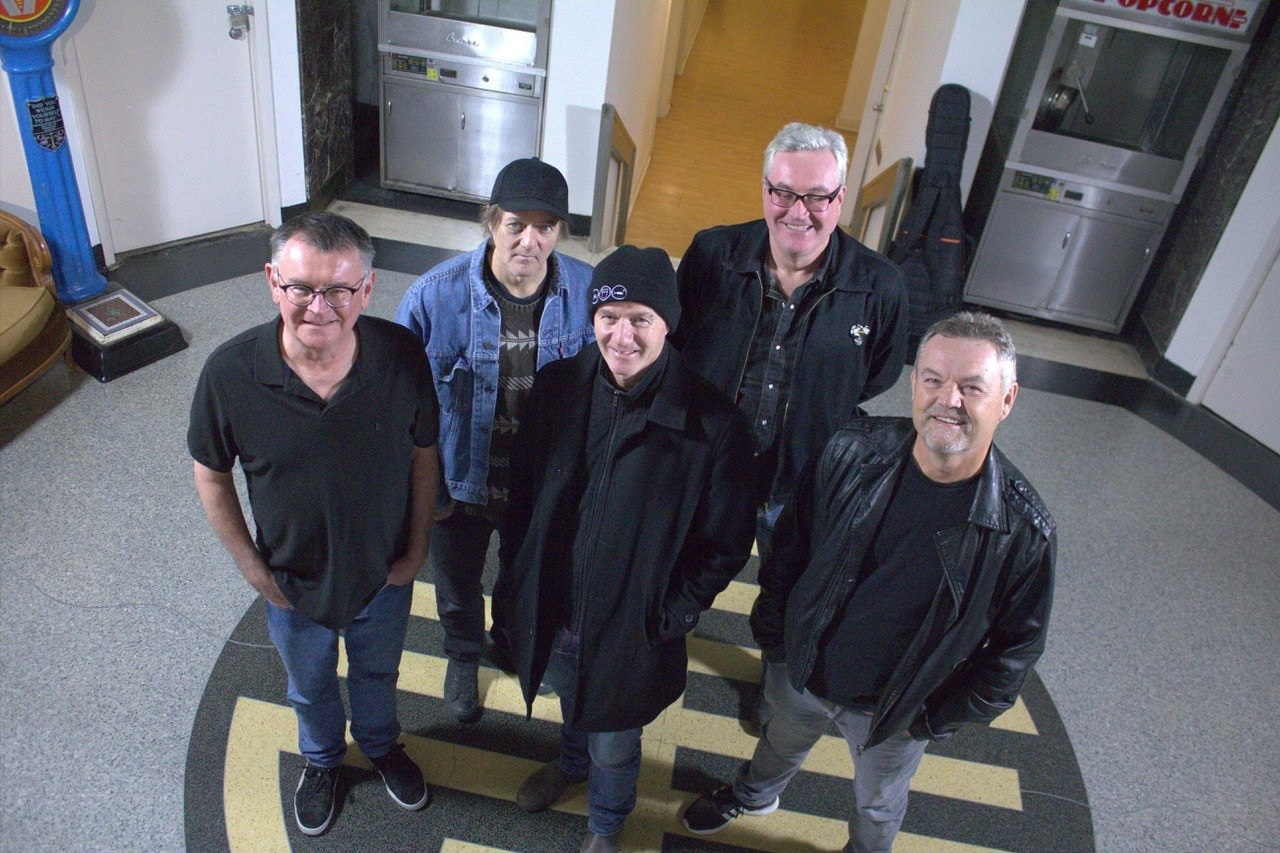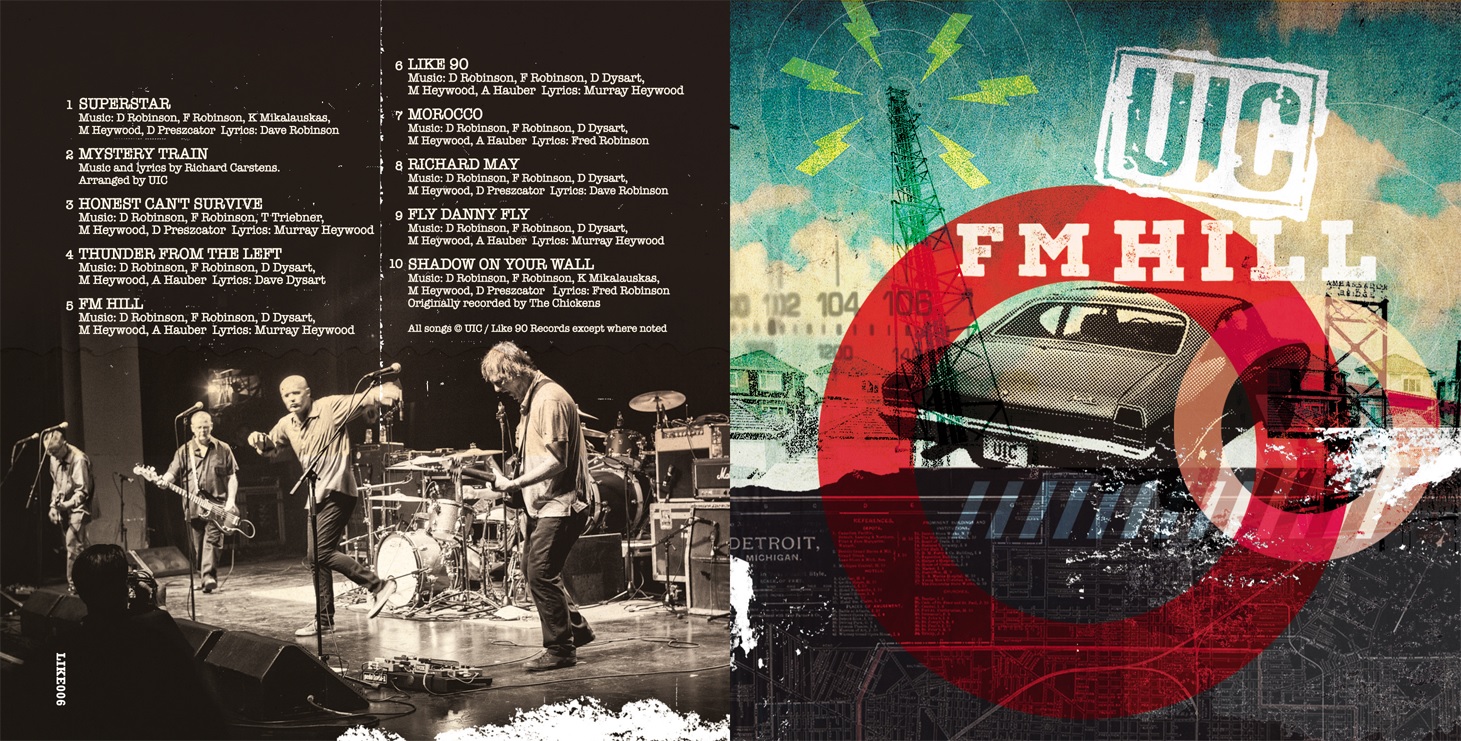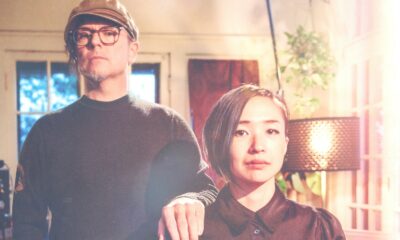Alternative/Rock
UIC’s Murray Heywood on the Band’s ‘FM Hill’ Album, Longevity, and Upcoming Livestream Concert

Arguably no industry has been hit harder by the COVID-19 pandemic than the music industry. But as the saying goes, only the strong survive, which is why the band UIC has chosen to get resourceful in order to connect with their fanbase. Taking place on April 24th, UIC will be performing a special livestream concert in Toronto, Ontario as part of the legendary Horseshoe Tavern’s Horseshoe Hootenanny concert series (purchase tickets here). It’s all in promotion of the band’s recently released new album, FM Hill, which was released this past October via the band’s own Like Ninety Records and Warner Music Canada.
Now nearing 39 years together, the members of UIC are still giving it their all, writing new songs and finding inventive ways of bonding with their audience. FM Hill was recorded in the summer of 2019 with the record being recognized for its classic UIC sound, combined with a more eclectic range of instruments, such as the trombone, trumpet, tenor sax, and alto sax.
To discuss the livestream show at The Horseshoe, FM Hill, and the group’s longevity, we recently spoke with the band’s Murray Heywood to find out more about what’s going on.
In honour of your brand new album FM Hill, you’re playing a very special livestream show at Toronto’s legendary Horseshoe Tavern. Take us through how this livestream show came about. Who originally came up with the idea?
Murray Heywood: “When the pandemic hit we were finishing up the record and started talking about live dates to promote the record, then bam everything just died. I had thought about a live stream event and discussed the possibility as a band but had no way to pull it off. Then we were approached by The Horseshoe and it seemed like the perfect fit. At least it is a chance to do something to promote the new record and to give our fans something other than a video to see. I hope people tune in. I am not going to lie, we also need a way to monetize it so we could make some money. This gives us that chance. UIC is a live band, that is where we thrive, so hopefully, we get lots of people tuning in from home, we get to have some people in the club to make it as close to normal as possible and let it happen.”
With the current restrictions in place, how difficult has it been to put this show together? Has it been a real challenge?
“It has been extremely challenging. This is relatively uncharted territory. Everyone is learning on the fly. There have been some false starts and we have had to move the date twice. Now we are scheduled for Saturday, January 23rd. We really appreciate the work The Horseshoe has done to make this possible, it has not been easy on them. When you release an independent record you are doing so with a limited PR budget, playing live is a huge part of a band being able to promote and sell records. You rely on momentum to move forward. While we didn’t spend millions of dollars, we have invested in putting out a good record and hiring the right people to produce it and promote it. Independent bands need a place to play to make money. The livestream was that glimmer of hope that bands could do just that.
Playing live is the ultimate experience, it is why I am in a band, I know the other guys feel the same way. UIC live shows are events, we do not do a lot of them so we want every one (of them) to be special. The record release live shows are what you look forward to. This will not be as good as a truly live show, but at the moment it is all there is. We just hope people will buy the livestream and enjoy it until we can really do it live again.”
How did The Horseshoe end up being the location for this show to take place? Was it the band’s idea to perform there?
“Firstly, The Horseshoe has been the club UIC plays in Toronto for a very long time. The ownership and staff feel like family to us. That is important. Secondly, The Horseshoe is the epitome of the sweaty rock n’ roll club. It is where rock n’ roll should be played. Small, loud and sweaty IS rock n’ roll. It is no accident that some of the greatest bands in history have played The Horseshoe stage. Craig Laskey reached out to us about the Horseshoe’s Hootenanny livestream series knowing that we had the album forthcoming. It seemed like the perfect fit in unperfect times.”
Have you had the opportunity to rehearse at The Horseshoe? Or are you just going to soundcheck and then play on the day of?
“This will be like any other live show, we will show up, set up, mic up, likely do an extended sound and visual check and let it happen. We have played The Horseshoe stage enough to know what to expect. There isn’t a better sounding stage in the business that I know of. This will be a ‘by the seat of our pants’ approach. We are ok with that, we have been doing that for over 35 years.”
Have you ever done a livestream show before or is this the first time?
“This will be the first time for a livestream event for UIC. We did do a drive-in show for Toronto Shines in the summer. That was strange but fun and we made the most of the experience. We will do the same with the live stream.”

Artwork for ‘FM Hill’ by UIC
With the tenuous place the music industry finds itself in right now, do you think livestream concerts will become much more commonplace, even when we can eventually leave this pandemic behind?
“Livestreaming is an interesting new concept for independent artists. It is unique in the sense that it does give you the potential for a much larger, international audience without the expense of trying to get to the country. The trick is promoting it. I think there is definitely room for more of this type of interaction with fans and potential fans, someone smarter than me will figure out how to use it wisely and profitably. The live show simply cannot be replaced, not for rock n’ roll, it’s the vibe and atmosphere of a small sweaty club that is the real appeal for rock n’ roll. Personally, if we are talking about large stadium shows, like seeing AC/DC or some other huge stadium rock band, I would rather watch that from my living room. What do you actually see if you are in the nose bleeds at (Toronto’s) Rogers Centre? Small sweaty club rock n’ roll cannot be duplicated in a live stream setting. Time will tell.”
I’m sure you’re excited that The Horseshoe show will include a limited number of fans. Are you at all nervous about playing in front of people again considering how long it’s been since you’ve been able to do a regular concert?
“Nah, I never get nervous playing in front of live fans, rock n’ roll isn’t supposed to be perfect, it is supposed to be raw and spontaneous. It is supposed to have heart and soul. UIC has always prided itself on being a tight live band, we work hard at it, but once you hit the stage anything can happen, that is what makes it cool and exciting. I personally cannot wait to get back out in front of live audiences again playing sweaty garage/punk rock n’ roll.”
Tell us a little bit more about FM Hill. When did you write and record it and how did the process go?
“FM Hill is a combination of new and older material. The new material is stuff that we wrote in the last couple of years, songs like, ‘FM Hill,’ ‘Richard May,’ ‘Thunder From The Left,’ ‘Fly Danny Fly,’ ‘Like 90,’ and ‘Morocco’ were all written during this time. We just finished ‘Morocco’ before we headed into the studio. ‘Superstar’ was a song we wrote at the very end of The Chickens (a band that was around from 1998-2004 that was four-fifths UIC), it was too new to make it on a Chickens’ record so we recorded it for this album because we thought it was a great song. The version of ‘Shadow on Your Wall’ was actually recorded by The Chickens and never got on a Chickens album. We simply remastered it and included it on FM Hill. The song ‘Honest Can’t Survive’ was a song I wrote in 1983, we recorded it as a demo but it never made it on a UIC record. We listened to it when we were starting to reform and liked it and started playing it live. It made it onto the record.
‘Mystery Train’ is a song that was given to us by the late great Richard Carstens that also appears on our Live Like 90 album. We thought it deserved a studio treatment. When we rekindled the UIC brotherhood in 2016 we were not thinking about a new record, we got back together as a one-off to say goodbye to an old friend by way of a tribute concert. We had a lot of fun and realized that we still enjoyed the music and playing together. When it came time to record we were very fortunate to have our new member Dave Dysart and all of his recording studio contacts. Dave set us up with Jeremy Darby at Canterbury Sound in Toronto. Jeremy has worked with some huge artists and has a great studio. We did all of the tracking there with Jeremy engineering.
When it came time to mixing, there were a few people we could have chosen. We chose Ian Blurton because he is Ian Blurton and would know exactly what a new UIC record should sound like. I have been an Ian Blurton fan for many years and when I heard that he wanted to mix the record I was very happy. It was strange not being able to be there for the mixing process, I really like that part of the process, however, due to COVID-19, Ian mixed the album alone and would send us mixes to listen to and comment on as he went along. All in all, it was a pretty smooth process.
When it came to the album cover, we turned to our friend and former UIC manager and road manager Patrick Duffy. Patrick designed both Our Garage and Live Like 90 covers, once again Patrick was the obvious choice for us. I love his work and he is fun to work with. I am certain Patrick would rather design our albums than ever tour with us again (laughs). He has some good road stories/memories, however, I am sure he likes this better. Putting this together was a great experience. Putting out a record is an awesome process and experience, and it produces music that will last forever in one way or another. It is a snapshot in time that we will be able to look back at and smile for years to come.”
What to you really stands out about FM Hill? What do you really like about these songs and how they turned out?
“I think FM Hill showed us that we could still capture energy and excitement on a record. We are not young guys anymore, however, if someone hears the songs with no context of UIC, I do not think their reaction would be, ‘hey what’s with the old guys.’ To me, it sounds a bit timeless like that. It is a throwback to a different style of recording, we just set up the gear, separate it as much as possible, get good sounds and hit record. There are very few overdubs. You know, it isn’t perfect, but it’s real and not comprised of a bunch of takes spliced together. It’s rock n’ roll. It has a pretty live off the floor feeling. It was great adding horns to some of the songs, that was a great experience and I love the results. Some of the best compliments I have had about the record so far is that it sounds raw and alive. That is always what UIC goes for. We want to be true to who we are.”
Being together for 38 years is a remarkable achievement. What do you think has helped keep the band together for so long?
“The core of UIC has always been brotherhood. Dave and Fred are actually brothers, however, we all grew up in the same small town in Southwestern Ontario, went to the same high school, hung out together as teenagers, played hockey and baseball together, and our families all knew each other. It was a typical small-town existence. Having those roots together made us a stronger unit. I have never really played in a band with strangers. When Ted and I left in 1990 and formed Positively Stompin, I was still playing with friends I grew up with. When I returned in 1998 and joined The Chickens, it was like I had never left.
The bottom line is that UIC is a family, it always has been. I love those guys. We lost Danny Hack Preszcator in 2018 and we lost Teddy T in 2019, so while things will never be the same, we simply had to find the right chemistry of new members to continue. We really found that with Dave Dysart and Andy Hauber. We are still a family, it’s special. I feel bad for people if they have not experienced that type of brotherhood. I cannot imagine it any other way. Families argue, don’t always agree, have different political and other beliefs, but you come together, love one another, and carry on through thick and thin. That is the only way to survive as a band for 38 years.”
What’s next for UIC? Are you planning on doing any more writing and recording any time soon?
“Once this pandemic has run its course we will resume playing live and doing what we can to get to as many people as possible. I know we have another record in us, maybe the next one will be our best one. That is what I always hope for. We will get back together start jamming and recording riffs, write some more stories, play some more rock n’ roll, continue to be brothers and keep doing this rock n’ roll things as long as we are able. That is as close to a plan as UIC ever has. That is an ok plan in my books.”
-

 Music1 week ago
Music1 week agoTake That (w/ Olly Murs) Kick Off Four-Night Leeds Stint with Hit-Laden Spectacular [Photos]
-

 Alternative/Rock2 days ago
Alternative/Rock2 days agoThe V13 Fix #011 w/ Microwave, Full Of Hell, Cold Years and more
-

 Alternative/Rock1 week ago
Alternative/Rock1 week agoThe V13 Fix #010 w/ High on Fire, NOFX, My Dying Bride and more
-

 Features1 week ago
Features1 week agoTour Diary: Gen & The Degenerates Party Their Way Across America
-

 Culture2 weeks ago
Culture2 weeks agoDan Carter & George Miller Chat Foodinati Live, Heavy Metal Charities and Pre-Gig Meals
-

 Music1 week ago
Music1 week agoReclusive Producer Stumbleine Premieres Beat-Driven New Single “Cinderhaze”
-

 Indie2 days ago
Indie2 days agoDeadset Premiere Music Video for Addiction-Inspired “Heavy Eyes” Single
-

 Alternative/Rock2 weeks ago
Alternative/Rock2 weeks agoThree Lefts and a Right Premiere Their Guitar-Driven Single “Lovulator”














